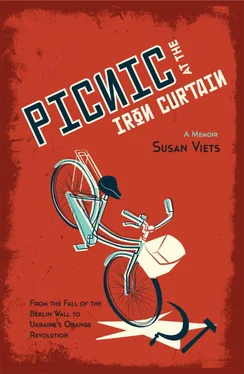A friend and I drove to the border, the highway north from Budapest to Austria, a sea of Trabants. People sang; passengers hung out the windows. At the border they cheered the guards who waved them through. For hours we stood and watched a steady stream of cars go by. Then in the early hours of the morning we drove back down the deserted highway to Budapest.
A week later I received my first letter from Sabine, who still lived in Dresden. By then she knew of Ute’s escape. I thought that I detected a note of bitterness in her letter when she wrote, “I was so busy that I couldn’t be sorry for Ute.”
Then I realized that Sabine missed Ute. “She [Ute] started to study now again. I hope the best for her. Sometimes I can’t believe it and it’s also difficult for me to stay alone in Dresden.” I thought of Sabine and Helga and the others who had stayed behind in East Germany and wondered what would happen next.
Soon I received a letter from Helga. She wrote that Ute was now studying chemistry in a town near Munich. Life in East Germany, Helga said, was turbulent. For several weeks people in Leipzig and Dresden participated in massive protest marches against the East German government. The protesters clashed with the police and the government imposed travel restrictions on East German citizens. Helga joined an opposition group that demanded political changes including free elections and economic reforms. She later wrote that “…the situation was really bad and sometimes I asked myself if it was the right decision to stay in the GDR [East Germany].”
I heard about these demonstrations on the radio. Some reports said that nearly 100,000 people marched at a time. I tried to imagine such huge crowds in narrow European streets, the possibility of tear gas and batons being used against them, but so many who demonstrated week after week was very bad news for Communist rulers.
* * *
On a grey Thursday morning in November, my clock radio alarm woke me, as usual, with the BBC news broadcast. The announcer said the Berlin Wall was being dismantled. I sat up in bed startled. This Wall that cut both Berlin and Germany in half was the ultimate symbol of the divide between communism and capitalism, Eastern Europe and the West. I could not believe the Wall would fall. I wanted to be there. Ute later captured in a letter what this event meant for East Germans. After her first walk from East Berlin to West Berlin she wrote, “you can’t imagine the feeling when I stood at last in this part of my home I never was allowed to go!”
I washed and dressed quickly, impatiently waited for public transport over the Széchenyi bridge to Moskva tér and Anna’s apartment. I arrived at 9:30 a.m. Anna and I swapped information in the kitchen and then she danced her way into the living room, as she celebrated the news. I followed behind, mugs of coffee in hand.
I tried to concentrate on the newspapers but felt distracted. I wanted to be in Berlin but had to stay put due to work obligations. Anna helped me develop a plan. If I took the last flight to East Berlin on Saturday night and the first back on Sunday, I could squeeze in a trip between assignments.
Helga lived in Berlin but left no telephone number for her university residence, which might not even have a phone. I would have no time to find her, but would just go to the Wall and spend the night there. I did not want to waste my few hours in Berlin on sleep.
I reached Checkpoint Charlie late at night. People laden with shopping bags streamed back from West Berlin. Laughter filled the air. There were so many happy faces and such exuberance on the West German side. It was one huge party at the Wall. That evening workers dismantled a section of the Wall at the Brandenburg Gate. With such crowds on the West German side, I could not actually see, so I stayed in East Germany for a better view.
East Berlin was nearly deserted and seemed spooky. Beyond Checkpoint Charlie, I only bumped into a few stray tourists, including a figure skater and his coach. We walked near the Brandenburg Gate and saw a gaping hole in the Wall, an entire section gone. Armed East German border guards still patrolled the area. They scowled. I wanted a piece of the Wall as a souvenir, so I moved closer to pick one up. One of the guards said something to me in German that I did not understand. Then he pointed his gun in my direction. I stepped back.
I continued to receive news from Helga. Ute was reunited with her family. She and Helga spent New Year’s Eve celebrating under the Brandenburg Gate. Helga visited Ute in West Germany. Both now understood the size of the discrepancy between the two Germanys. Helga wrote that at her university in East Germany, “… we as students have to learn to fight for our rights now…. Some of the biggest problems are the bad living conditions in the dormitories, the old equipment in the laboratories, bad lectures, the low level of language education, too less money and so on. It was interesting and a little bit depressive to compare our conditions with those of Ute’s student life.”
I received my last letter from Helga in early 1990. She had changed universities and would soon study at the Technical University of West Berlin. She invited me to visit and offered to guide me through both sides of Berlin. She said that she now knew the Western sector well. I felt tempted, but already had my sights set on a trip in the opposite direction, farther east, into the Soviet Union.
3

KIEV
On an early June evening in 1990 nearly one year after Ute, Helga and Sabine had arrived at my apartment, I stood on a platform at the Keleti station in Budapest waiting to board the train to Kiev. A group of friends came to see me off. After the last hug, I turned to step up rusty metal rungs into the train carriage. I heard a friendly voice behind me shout, “Behave yourself in the Gulag. I hope we see you again.”
I entered the carriage, and a new world. A worn red carpet stretched down the train corridor. I walked through the narrow passage to my compartment. I slid the door open. Faded cream-coloured curtains hung across the bottom half of the compartment window; the air smelled of dirty mop water. I faced four bunks. Mine was the top right-hand berth. I climbed up and stowed my bags away. I lay down and did not look out the window. I thought that I might change my mind about moving to Kiev if I saw my friends still by the train. I already missed them.
I heard the door slide open and shut my eyes, pretending to sleep. I was not yet ready to meet my cabin mates. A couple, husband and wife, and one other man settled in, speaking softly in Russian. The husband mumbled Tanya and something about bags.
“Ivan, leave the food on the table,” Tanya said. “Where’s the vodka? Don’t forget the pickles.” Ivan and Tanya did not know the second man, who had the bunk opposite me.
The train pulled out of the station. Budapest receded. We clickety-clacked down the track, the train swaying soothingly. I relaxed, my mind free to wander in a way it had not been able to since my time in hospital. I thought of Ute and remembered what she had said when I asked her why she wanted to escape — “I don’t feel free.” She built a new life in West Germany. I headed in the opposite direction, toward the centre of her old world. Anna’s husband, Gyula, had warned me that in this part of the Communist Bloc I might feel the same as Ute did. “The state will be your enemy,” he said. “It will control where you sleep, what you eat and when you leave.” I felt a pit in my stomach, a yawning chasm of worry as I thought back on those words. At the time, I dismissed them as exaggeration.
Читать дальше













